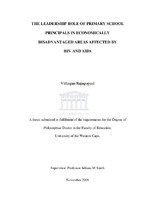| dc.contributor.advisor | Smith, Juliana M. | |
| dc.contributor.author | Rajagopaul, Vithagan | |
| dc.contributor.other | | |
| dc.contributor.other | Faculty of Education | |
| dc.date.accessioned | 2013-10-11T08:29:10Z | |
| dc.date.available | 2009/05/08 07:46 | |
| dc.date.available | 2009/05/08 | |
| dc.date.available | 2013-10-11T08:29:10Z | |
| dc.date.issued | 2008 | |
| dc.identifier.uri | http://hdl.handle.net/11394/2235 | |
| dc.description | Philosophiae Doctor - PhD | en_US |
| dc.description.abstract | This study formed part of the broad theme on the impact of HIV and AIDS on school-going learners sponsored by the Dynamics for Building a Better Society programme of the University of the Western Cape and the VLIR Partnership. HIV and AIDS poses a unique challenge to society in that it is a private disease transmitted mainly through unprotected sex that still has no known cure. A challenge to society invariably challenges schools. Primary school principals are obligated to respond because learners in the 5 to 14 year age range provide an opportunity for education, advocacy, prevention, treatment and support. This study aimed to contribute to a better understanding of school leaders and their responsibility towards HIV and AIDS and poverty. | en_US |
| dc.language.iso | en | en_US |
| dc.publisher | University of the Western Cape | en_US |
| dc.subject | Leadership in education | en_US |
| dc.subject | School principals | en_US |
| dc.subject | HIV/AIDS South Africa | en_US |
| dc.title | The leadership role of primary school principals in economically disadvantaged areas affected by HIV and AIDS | en_US |
| dc.type | Thesis | en_US |
| dc.rights.holder | University of the Western Cape | en_US |
| dc.description.country | South Africa | |

